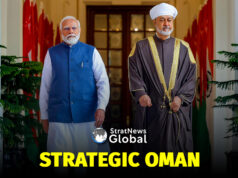NEW DELHI: Japan’s Prime Minister Shinzō Abe will still “carry a lot of clout” and is likely to anoint his successor, says former Indian Ambassador to Tokyo Deepa Gopalan Wadhwa. There will be “continuity in foreign policy” at least till elections scheduled before October 22, 2021, she told StratNews Global Associate Editor Amitabh P. Revi after the PM announced his resignation because of recurring chronic illness. Among the front-runners to succeed him are Liberal Democratic Party (LDP) policy chief Kishida Fumio and Chief Cabinet Secretary Suga Yoshihide, the former ambassador points out, are close to Abe.
The ex-envoy also says the military logistics pact ACSA (Acquisition and Cross-Servicing Agreement) that is expected to be signed at the September annual Prime Ministerial summit has a “lot to do with PM Abe”. Ambassador Wadhwa traces the history of the global strategic partnership between India and Japan and says the “extremely and inordinately fast and quick progress” despite the historical “restraints” Tokyo has had is due to “receptivity on both sides”. She also says many of the ideas accepted and “embraced” today like the free and open Indo-Pacific concept and the Quad were “mooted” years ago by Abe, “the internationalist”.
PM Abe’s political pedigree “helped him to have a very special relationship” with India that goes back to his maternal grandfather Nobusuke Kishi, who was the first Japanese PM to visit India in 1957, Wadhwa says, adding, “India was the first to accept development cooperation aid after that trip and that relationship has been carried forward to date”.
The ex-envoy in whose term the India-Japan nuclear deal was negotiated, says “the 2016 signing was very special” because it overcame domestic Japanese historical restraints of being the only country to be nuclear-bombed, India being a non-signatory to the Nuclear Non-proliferation Treaty (NPT), and the 2011 triple disasters of the devastating mega-earthquake, tsunami and the Fukushima Daiichi nuclear catastrophe.
PM Abe has “walked the fine line” with China “quite well”, “especially with the major security threats spiking over the last year,” Wadhwa says, and “balanced the relationship with the U.S.” He has also kept the Trans Pacific Partnership (TPP) alive despite President Trump pulling out and tried to resolve the Northern Islands issue with Russian President Vladimir Putin. But, as Abe himself said at his resignation press conference, she concludes, he has also apologised for things left half done like the abduction of Japanese nationals by the North Koreans and some of the “arrows of Abenomics”.
The 'Eye' of the story not the 'I' of the story. That's Amitabh Pashupati Revi's credo from the beginning of his professional journey in 1995. From conflicts in the war zones of Afghanistan, Syria, and Iraq to nuances of international politics in the Maldives,Thailand, and South Sudan, Amitabh has reported from all the world's continents, except for Antarctica(so far). Though, he has documented the world's third pole, the Siachen Glacier!
Amitabh reports and produces documentaries on the two-front China-Pakistan threat to India. His ground reports from Arunachal Pradesh and Ladakh have received viewership in the hundreds of thousands. Amitabh has interviewed world leaders, top global analysts, and experts in India, Russia, the United States, and Australia as well. Along the way, he’s picked up the Russian language, the Ramnath Goenka Award for his reporting on the 'Islamic State' terrorist group in Iraq, the Khaled Alkhateb Award for his reporting from Palmyra, Syria, and the UN Dag Hammarskjöld Distinguished Journalist Fellowship. Last but not least, as a founder member of StratNews Global, Amitabh helps lead the reporting, editorial, production, and administration teams at StratNews Global, BharatShakti, and InterStellar on their journey ahead.




